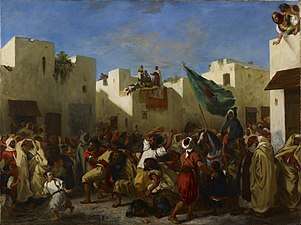Fanaticism
Fanaticism (from the Latin adverb fānāticē (fren-fānāticus; enthusiastic, ecstatic; raging, fanatical, furious)[1]) is a belief or behavior involving uncritical zeal or with an obsessive enthusiasm. Philosopher George Santayana defines fanaticism as "redoubling your effort when you have forgotten your aim".[2] The fanatic displays very strict standards and little tolerance for contrary ideas or opinions.

Tõnu Lehtsaar has defined the term fanaticism as the pursuit or defence of something in an extreme and passionate way that goes beyond normality. Religious fanaticism is defined by blind faith, the persecution of dissents and the absence of reality.[3]
In his book Crazy Talk, Stupid Talk, Neil Postman states that "the key to all fanatical beliefs is that they are self-confirming....(some beliefs are) fanatical not because they are 'false', but because they are expressed in such a way that they can never be shown to be false."[4]
The behavior of a fan with overwhelming enthusiasm for a given subject is differentiated from the behavior of a fanatic by the fanatic's violation of prevailing social norms. Though the fan's behavior may be judged as odd or eccentric, it does not violate such norms.[5] A fanatic differs from a crank, in that a crank is defined as a person who holds a position or opinion which is so far from the norm as to appear ludicrous and/or probably wrong, such as a belief in a Flat Earth. In contrast, the subject of the fanatic's obsession may be "normal", such as an interest in religion or politics, except that the scale of the person's involvement, devotion, or obsession with the activity or cause is abnormal or disproportionate to the average.
Types
- Consumer fanaticism – the level of involvement or interest one has in the liking of a particular person, group, trend, artwork or idea
- Emotional fanaticism
- Ethnic or racial supremacist fanaticism
- Leisure fanaticism – high levels of intensity, enthusiasm, commitment and zeal shown for a particular leisure activity
- Nationalistic or patriotic fanaticism
- Political, ideological fanaticism.
- Religious fanaticism – considered by some to be the most extreme form of religious fundamentalism. Entail promoting religious views
- Sports fanaticism – high levels of intensity surrounding sporting events. This is either done based on the belief that extreme fanaticism can alter games for one's favorite team (Ex: Knight Krew),[6] or because the person uses sports activities as an ultra-masculine "proving ground" for brawls, as in the case of football hooliganism.
See also
| Wikiquote has quotations related to: Fanaticism |
| Look up fanaticism in Wiktionary, the free dictionary. |
- The Anatomy of Revolution
- Antifanaticism: A Tale of the South
- Enthusiasm
- Extremism
- Fanboy
- Fixation (psychology)
- M. Lamar Keene
- Obsession (psychology)
- The True Believer
- Zealotry
References
- "THE MANY FACES OF FANATICISM" (PDF).
- Santayana, George (1905). Life of Reason: Reason in Common Sense. (New York: Charles Scribner's Sons) 13.
- "THE MANY FACES OF FANATICISM" (PDF).
- Postman, Neil (1976). "Fanaticism". Crazy Talk, Stupid Talk. pp. 104–112. ISBN 0-440-01554-5.
- Thorne, Scott; Bruner, Gordon C. (2006). "An exploratory investigation of the characteristics of consumer fanaticism". Qualitative Market Research. 9 (1): 51–72. doi:10.1108/13522750610640558. ISSN 1352-2752.
- Mackellar, J. (2006). "Fans, fanatics or just good fun - travel behaviours of the leisure fanatic". Journal of Vacation Marketing. 12 (3): 195–217. doi:10.1177/1356766706064622.
Further reading
- Haynal, A., Molnar, M. and de Puymege, G. Fanaticism. A Historical and Psychoanalytical Study. Schoken Books. New York, 1987
- Rudin, J.Fanaticism. A psychological Analysis. University of Notre Dame Press. London, 1969.
- Collins, Jack. "Real Times". University of Santa Barbara. California. 1993.
- Беляев, И.А. Религиозный фанатизм как иллюзорная компенсация недостаточности духовно-душевных составляющих целостного мироотношения / И.А. Беляев // Вестник Челябинской государственной академии культуры и искусств. — 2011. — № 4 (28).— С. 68-71.